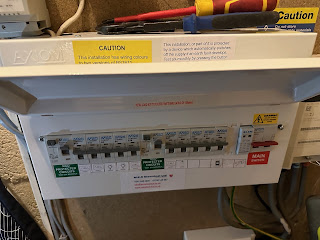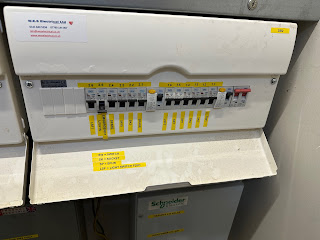In the fast-paced world of business, a sudden electrical issue can bring operations to a grinding halt. Whether it's a power outage, a faulty circuit, or a safety hazard, businesses in Glasgow rely on the expertise of emergency electricians to resolve issues quickly and efficiently.
In this blog, we’ll explore the importance of having a reliable emergency electrician for your commercial property, common scenarios requiring immediate attention, and how Glasgow businesses can ensure they’re prepared for electrical emergencies.
Why Emergency Electricians in Glasgow Are Essential for Commercial Spaces
Commercial spaces in Glasgow—from offices and retail shops to restaurants and warehouses—have unique electrical demands. When a problem arises, it can disrupt operations, inconvenience customers, and even pose serious safety risks. Emergency electricians provide:
- Immediate Response: Rapid service to minimize downtime and losses.
- Expert Diagnosis: Identification of complex issues that general electricians may not handle.
- Safety Assurance: Prevention of potential hazards like electrical fires or shocks.
- Compliance Maintenance: Ensuring all repairs meet Glasgow’s strict commercial safety standards.
Common Electrical Emergencies in Glasgow’s Commercial Sector
- Power Outages: A sudden loss of power can halt business operations, leading to lost revenue and frustrated customers.
- Faulty Circuits: Overloaded or damaged circuits can trip frequently, disrupting equipment or lighting.
- Lighting Failures: Essential for retail spaces, offices, and warehouses, broken lighting systems can compromise productivity and safety.
- Electrical Fires: Faulty wiring or equipment can lead to sparks or fires, requiring immediate intervention.
- Equipment Failures: Essential appliances or machinery breaking down due to electrical faults can cripple operations in industries like food service or manufacturing.
- Alarm System Malfunctions: Fire alarms, security systems, or emergency lighting going offline can create safety and compliance issues.
Benefits of Hiring an Emergency Electrician in Glasgow
1. Minimized Downtime
Every second counts in a commercial setting. Emergency electricians provide quick solutions to get your business back up and running, reducing revenue losses.
2. Professional Expertise
Emergency electricians are trained to handle high-pressure situations and complex systems, ensuring your property is safe and compliant.
3. 24/7 Availability
Electrical emergencies don’t follow a 9-to-5 schedule. Reputable emergency electricians in Glasgow offer round-the-clock service, so you’re never left in the dark.
4. Glasgow-Specific Knowledge
Local electricians understand the unique electrical systems and compliance regulations specific to Glasgow’s commercial properties, ensuring the right fixes every time.
How to Choose the Right Emergency Electrician Westend Glasgow for Your Business
When selecting an emergency electrician for your commercial property in Glasgow, consider these key factors:
1. Availability: Choose a service that offers 24/7 support. Emergencies can happen at any time, and you need a team ready to respond.
2. Experience: Ensure the electrician has experience with commercial systems, which are often more complex than residential ones.
3. Licensing and Certification: Verify that the electrician is fully licensed and certified to work in Glasgow, meeting all compliance requirements.
4. Reputation: Read online reviews and ask for references to gauge the reliability and quality of the service.
5. Response Time: Look for a company with a track record of fast response times to minimize disruption.
Emergency Electricians in Southside Glasgow: How They Operate
The process of responding to an electrical emergency typically involves the following steps:
- Assessment: The electrician will diagnose the issue to determine its cause and severity.
- Immediate Action: Urgent repairs or temporary fixes are implemented to restore functionality or eliminate hazards.
- Comprehensive Repairs: Once the immediate danger is mitigated, the electrician will carry out more permanent solutions.
- Testing and Compliance: The repaired system is thoroughly tested to ensure safety and compliance with regulations.
- Follow-Up Advice: Recommendations are provided to prevent future issues, such as upgrading outdated systems or implementing regular maintenance schedules.
Why Local Expertise Matters in Glasgow
Emergency electricians in Glasgow bring more than just technical knowledge—they understand the unique challenges of the city’s commercial landscape. Whether your business is in the bustling city center or in areas like Finnieston or Hillington, local electricians offer:
- Familiarity with Glasgow’s electrical infrastructure and commercial property regulations.
- Quick access to your location for rapid response.
- Knowledge of common issues faced by Glasgow businesses, such as aging electrical systems in historic buildings.
Preventing Electrical Emergencies in Your Business
While emergencies can’t always be avoided, proactive measures can reduce their likelihood:
- Regular Electrical Inspections: Schedule routine EICR (Electrical Installation Condition Report) testing to identify potential issues before they escalate.
- Upgrading Old Systems: Replace outdated wiring or overloaded circuits to prevent frequent failures.
- Maintenance Contracts: Partner with an electrical contractor for ongoing maintenance and priority service during emergencies.
Conclusion
Electrical emergencies in commercial spaces can be disruptive, costly, and even dangerous. Having a reliable emergency electrician in Glasgow ensures your business stays operational, safe, and compliant.
Whether it’s a sudden power outage in your office or a faulty circuit in your restaurant, professional emergency electricians are ready to handle the job.
Don’t wait until disaster strikes—connect with a trusted commercial emergency electrician in Glasgow today to safeguard your business. With expert support, you can focus on growing your business, knowing your electrical systems are in safe hands.





